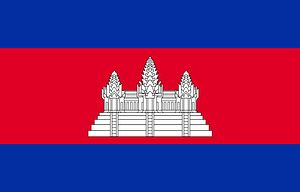Former Cambodian Prime Minister Pen Sovann, who led his country at a crucial time following the late 1978 invasion and occupation by Vietnamese-led forces, died recently with barely a word said by this country’s ruling elite.
Pen Sovann, 80, passed away after a long illness.
He was among the vanguard of Cambodian defectors who fled to Hanoi during the bloody and brutal years of the Khmer Rouge. They returned with the backing of Vietnamese troops in December 1978, pushed Pol Pot into the countryside and uncovered atrocities which rated among the worst of the twentieth century.
His bravery and honesty won the hearts of many and he was installed as Prime Minister in June 1981. But he held the job only until December when an ongoing dispute with the Vietnamese and Le Duc Tho – Hanoi’s chief advisor to the Kampuchean United Front for National Salvation – ended his political career and cleared a path for Hun Sen to become prime minister.
In an interview with this journalist during a political comeback at elections in 2013, Pen Sovann said that contrary to the very few reports about his past, the dispute with Tho had more to do with saving Cambodian lives than his own political ambitions.
Tho, according to Pen Sovann, wanted to station 10,000 Vietnamese troops in each province which would have taken the number of occupying soldiers on Cambodian soil to more than 200,000, an intolerable figure for locals.
Relations soured and the Vietnamese envoy – who refused to share a Nobel Peace Prize with former U.S. Secretary of State Henry Kissinger – antagonized ties further by demanding Cambodian families be moved into zones heavily infiltrated by the Khmer Rouge to help pacify locals.
He wanted also Cambodian land for Vietnamese food production.
“I did not want Cambodians to get killed and that’s why the Vietnamese wanted to get me out,” he said through a translator.
Following Pen Sovann’s arrest, Chan Sy was installed. He held the post until Hun Sen took over in January 1985, a position he still holds to this day.
Pen Sovann said that, following his arrest, he was taken to the first of two prisons in the Ha Dong district of Hanoi and was kept in solitary confinement, in the dark with a hole for a toilet and a pipe with cold water used for showering.
He said prisoners were allowed 15 kilograms of a rice a month – barely enough. He had rice soup for breakfast while rice for lunch and dinner was accompanied by half a boiled egg.
“It was always dark, there was no sunlight, no windows.”
Pen Sovann said prisoners were not allowed to converse but he was astonished to discover that in both prisons there were American soldiers, up to ten in all. This was more than seven years after the Vietnam War had ended and the last of American prisoners of war were supposed to have been repatriated.
“They were my neighbors. I can confirm that they were still alive when I got out in 1992. None of them got out with me,” he said.
Speculation about American MIAs remaining in Vietnam long after the war had ended persisted for decades. In their book An Enormous Crime, authors Bill Hendon and Elizabeth Stewart claimed an enormous cover-up in the United States and Vietnam over hundreds of MIAs.
Pen Sovann said holes in the walls dividing the cells enabled prisoners to communicate and he would listen into their conversations but he could not say how or when they arrived in Vietnam.
“Some spoke in Vietnamese and I could hear their conversations through holes in the wall and I could understand their conversations. One was called ‘The General,’” he told me. “Perhaps they were kept until they died.”
Pen Sovann lived in obscurity after his release in early 1992. He was snubbed by Cambodian officials and took years to recover from his ordeal. Some describe Hun Sen’s attitude to his former rival as “bitter.”
At that time, stories circulated that Chea Sim, a senior member of the ruling Cambodian People’s Party (CPP) offered Pen Sovann a place back in politics. However, Hun Sen had objected, arguing such a move would upset the hierarchy in Hanoi.
“It’s true,” Penn Sovann added. “That’s what happened.”
He attempted a political comeback with the opposition at elections in 2013, but poor health ensured he played a backseat role in his nation’s affairs.
Luke Hunt can be followed on Twitter @lukeanthonyhunt

































